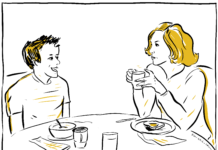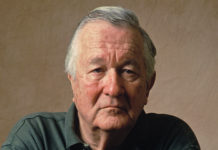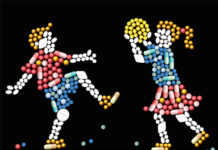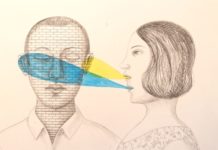Yearly Archives: 2019
It Will Take More Than a $34,000 Drug to Stop Postpartum Depression
From The New York Times: Zulresso is just a stopgap, and yet another instance of pathologizing a very sane reaction to our very insane culture.
The Impact of Regression to the Mean in Psychiatric Drug Studies
Could the statistical phenomenon of regression to the mean be responsible for the dramatic effects of placebo—as well as the supposed effectiveness of some psychiatric drugs?
Caroline Mazel-Carlton: Judaism Madness and Spirit
Voice hearers, mystics, visionaries, and mad people are found throughout the scriptures of Judaism. What does Jewish theology have to teach us about madness and psychiatric diagnosis?
In Ontario, a Battle for the Soul of Psychiatry
From The Globe and Mail: A proposal made by the Ontario Ministry of Health in January would radically limit psychotherapy provided by psychiatrists and family physicians.
Psychosocially Oriented Psychologists Struggle Against the Medical Model
Interviews with psychosocially oriented psychologists demonstrate their experiences of discomfort with the hegemony of the medical model in their place of work and the conflicts that arise when they attempt to provide alternatives.
What I Have Learned from My Psychosis
During my periods in forced hospitalization, I did not feel that the psychiatrist understood how much I suffered. When I stayed in solitary, I felt that the earth would vanish. There I was, locked away from my loved ones. I thought I wasn’t allowed by the secret service to talk with anyone. But during my psychosis, I met God, and I found out that God is love.
William Styron: His Struggles with Psychiatry and Its Pills
Author William Styron is often remembered for speaking about depression as an illness. But a review of his life reveals that psychiatric drugs may have triggered and even worsened his depressive episodes.
The Science and Pseudoscience of Women’s Mental Health: Conversation with Kelly Brogan
A conversation with Dr. Kelly Brogan, a leading voice in natural approaches to women’s mental health. With degrees from MIT and Weil Cornell Medical College, triple board certification in psychiatry, psychosomatic medicine and integrative holistic medicine, Dr. Brogan is uniquely qualified to challenge the pseudoscience of the chemical imbalance theory and the drug regimens that it spawned.
My Name Is Rachel: Interview With Rachel Waddingham
From BBC Sounds: This is Rachel’s story of being sectioned in 21st century Britain. She asks why she doesn’t have more rights to decide her own care, and how to break the cycle of the ‘revolving door’ patient.
Mental Health Recovery Narratives Play Central Role in Trauma-Informed Care
New research synthesizes insights from 45 studies to construct a conceptual framework relating different elements of recovery narratives to trauma-informed approaches to care.
ECT Explained by a CET (Certified Engineering Technologist)
A scientific understanding of electricity’s effects on the human body has only been around since the last half of the 20th century. If this understanding of electric shock and electrical injury was had in the first part of the 20th century, electroconvulsive therapy (ECT) would likely never have been accepted by modern western medicine.
U.S. Marine and Navy Suicides at a 10-Year High
From CNN: Many of the cases are young Marines who have not deployed overseas or been in combat -- a situation observed in other branches of the military as well.
More Psychological Supports Needed to Manage Antidepressant Discontinuation
Study reviews psychological interventions for antidepressant discontinuation.
Why “Middle-Grounders” May Be as Dangerous as APA Presidents
When above-the-fray/middle-roaders jump on bandwagons and criticize only those aspects of psychiatry that have become fashionable to criticize but don’t challenge the legitimacy of psychiatry as an authority, they hurt more than they help. They provide the false impression that psychiatry is self-correcting and progressing.
Where Mental Health and Social Justice Meet
From Robert Wood Johnson Foundation: What it means to be a black American struggling with mental health is that socio-historical 'trauma lives in our blood,' materializing in our daily lives.
Withdrawal Symptoms Routinely Confound Findings of Psychiatric Drug Studies
Researchers examine how rapid discontinuation can mimic the relapse of mental health symptoms and confound psychiatric drug studies.
I Will Fight for You by Atara Schimmel
she
is the one
that i want
the one that
i love
she fights
for justice
like a wild cat
fighting for her cub
fangs and claws
because freedom is everything
Q&A: Is My Child Being Overdrugged?
My eight-year-old daughter has diagnoses of ADHD, depression, anxiety, and ODD. She is taking four prescribed drugs, but she is still suffering and her behavior hasn’t changed much. Her doctor is suggesting adding yet another med. I’m wondering how many drugs are enough? I am starting to think she should go off some of them. I want to trust the psychiatrist, but I’m just not sure anymore.
America’s Forgotten Mass Imprisonment of Women Believed to Be Sexually Immoral
From The History Channel: From the 1910s through the 1950s, tens—perhaps hundreds—of thousands of American women were detained and forcibly examined for STIs.
Psychiatrists View Drug-Free Programs for Psychosis as “Unscientific,” Study Finds
A new study provides an insider’s look into how psychiatrists view the establishment of drug-free programs in Norway.
The Hints That Psychotherapy Clients Drop
Clients regularly hint in passing at what’s causing their distress. The hints we get from a client help us determine which of these many causes are more probable than the others or maybe even which is the cause. Nor is it hard to hear these hints, if we train ourselves to listen for them. Responding to causal hints with a spirit of inquiry and careful talking points deepens the work.
Concern Over Rising Antidepressant Use in England
From BBC News: A total of 70.9 million prescriptions for antidepressants were dispensed in England in 2018, almost double the number dispensed in 2008.
Britney Spears and a Civilised Response to her Mental Health
From The Guardian: In 2019, suffering is less a spectacle, more something to be understood. It is a tentative sign that the conversation is, at last, maturing.
The Therapeutic Role of Blame
When fault is not placed on the right people, innocent people are left vulnerable and alone. They may also begin to question their ability to trust their own feelings and perceptions. When you refuse to blame the people who are legitimately at fault, you gaslight the people their actions are injuring, piling on additional hurt and making it much harder for the wounded to heal.
Higher Minimum Wage May Result in Fewer Suicide Deaths, Study Finds
New research suggests that minimum wage laws provide financial security that may help prevent suicide.

































